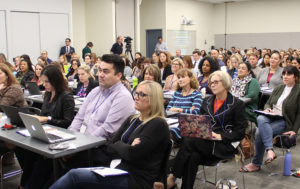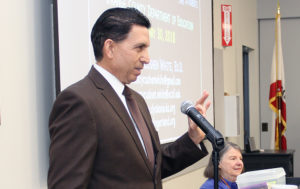Magic Johnson, Gavin Newsom, Steven Spielberg and Henry Winkler all have something in common aside from their fame. They each suffer from dyslexia.
But the learning disability hasn’t stopped them from finding tremendous success in business, entertainment, politics and other fields.
 About 200 educators, school administrators and experts cited these individuals at a summit Tuesday as examples of how prevalent the disability is, and how important it is to better serve students suffering from dyslexia.
About 200 educators, school administrators and experts cited these individuals at a summit Tuesday as examples of how prevalent the disability is, and how important it is to better serve students suffering from dyslexia.
The “Demystifying Dyslexia: A Conversation About Cognitive Diversity, Structured Literacy and Supporting All Students” conference, held at the Orange County Department of Education, was aimed at finding ways to better serve and identifying the 5 to 20 percent of students across the state who suffer from some aspect of the learning disability.
“The ability to read is a fundamental skill in modern society,” State Superintendent of Public Instruction Tom Torlakson said. “For people with dyslexia, this skill could be out of reach, leaving them frustrated.”
The day-long conference included sessions on the creation of better assessments for students, professional learning opportunities for teachers, and how new state policies will impact public schools.

The conference coincides with the the state Department of Education’s recently released California Dyslexia Guidelines, a 132-page document meant to help educators learn exactly what dyslexia is and what interventions have worked best.
Besides Torlakson, other speakers included Orange County Superintendent of Schools Dr. Al Mijares, Chapman University President Daniele Struppa and Nancy Cushen White, an expert in the field and researcher at UC San Francisco.
“Having a conversation about demystifying dyslexia is powerful because it will help meet the needs of all of our students,” Mijares said. “It’s important to understand that dyslexia is not reflective of intelligence. It’s a structural issue that we can change.”
